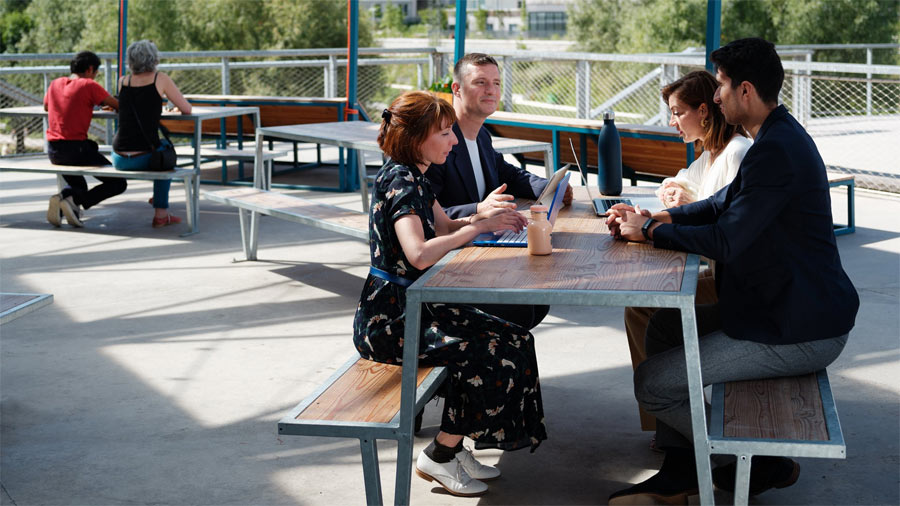
Embarking on a new adventure in Paris Region can be an exciting but challenging prospect, especially when it comes to understanding the unique French business culture. In this article, we've teamed up with three seasoned experts to share their top tips and advice: Alix Carnot, from Expat Communication, Thibaut Issindou from Gapsmoov, and Juan E. Marcos from Anemo.
These insights are your trump card for a smooth transition, helping you not just to adapt but thrive in the face of the legendary 'cultural shock.' Our experts will walk you through the fascinating intricacies of professional and personal cultural differences, making sure you're well-equipped for your journey in the Region. They're here to provide customized solutions that can help companies integrate their foreign team members and make newcomers feel like seasoned locals.
What key aspects of French business culture and values should foreign talents be aware of before moving to France?
“Paris is a celebration" (“Paris est une fête”) written by Hemingway decades ago, but his experiences in France also highlight the need to acknowledge the gap between the romanticized image of French life and its day-to-day reality. Similarly, for foreign talents contemplating a move to France for work, it's essential to grasp the nuances of French business culture and values. While France is celebrated for its rich culture and quality of life, the actual professional landscape can be quite distinct, demanding a unique understanding.
According to the Expat Barometer that Expat Communication runs with Choose Paris Region, more than 90% of the expatriates surveyed recommend relocating to France. However, some individuals may find it challenging to adapt to the country and certain aspects of its business culture.
Therefore, here are some important points to keep in mind:
Initially, it might be tough to connect with the French, both in and out of the office, as they value meaningful conversations and prioritize authenticity and constructive debates over surface-level friendliness.
Even as they separate personal and professional lives, French professionals highly value one-on-one relationships, fostering trust and rapport over time.
Moreover, the French business landscape takes a step back to thoroughly analyze issues, focusing on theory and the "why" behind decisions. They're willing to trade speed for precision, resulting in longer decision-making timelines due to risk-averse tendencies.
However, this approach yields well-considered decisions, effective leadership, and technically sound solutions, contributing to their reputation for excellence in industrial projects and luxury. In essence, understanding and embracing these unique values can be the key to thriving in French business culture.
How can entrepreneurs and expatriates successfully do business with French companies or customers?
When you start a business in a foreign country, like France, it's crucial to grasp the unwritten rules that shape how professionals in your industry interact. For expatriate entrepreneurs, building a trustworthy professional network is equally vital for achieving success. This is why it's essential not only to understand French culture but also to develop strategies to become a part of the local professional community and connect with reliable individuals.
Moreover, in a market like France, where personal relationships often intertwine with professional success, your ability to assimilate into local networks can significantly impact your venture's trajectory. This underlines the importance of actively participating in community events, industry gatherings, and local initiatives.
Immersing yourself in the local business culture is also about aligning your brand with the values and expectations of the French market, creating a resonance that goes beyond transactions to foster lasting partnerships.
As an expatriate entrepreneur in France, your success story isn't just about what you offer but how well you integrate into the fabric of the local business community. By combining respect for local customs with adaptability, patience, and a strategic approach to rebuilding professional networks, you can build meaningful and lasting business relationships in France.
As an expatriate in a large company, the process will be similar: setting up your network and establishing one-on-one relationships with key people in the organization will have a strong and lasting impact.
What are some resources or communities that foreign talents can tap into for support, guidance, and networking opportunities in Paris Region?
In the vibrant professional landscape of Paris Region, foreign talents can access a wealth of resources and communities. Active participation in events, workshops, and tradeshows is crucial for building a robust professional network. Explore industry-specific associations, attend networking events, engage with online platforms like LinkedIn, leverage the support services provided by business chambers, and more.
If you're embarking on a tech or innovative project, delve into the dynamic startup ecosystem by exploring incubators and innovation hubs in Paris Region, and their key players - Station F, France Digitale, the French Tech startup ecosystem... These hubs often organize events, pitch sessions, and networking opportunities, fostering connections for both entrepreneurs and professionals.
Proactive engagement in these diverse opportunities is key to successful integration into the thriving professional community of Paris Region.
At Anemo, we've curated specialized programs for expatriate entrepreneurs in Paris Region, like the EDGE programme. This initiative provides recreational activities, networking events, an online resource hub, and personalized support through training sessions, workshops, and One-to-One coaching. Through EDGE, we aim to connect expatriate talents with business and investment opportunities in the Parisian entrepreneurial ecosystem.
For corporate assignees, Expat Communication developed the Club Expat Premium with networking events, resources about settling in France for expatriate families, and very comprehensive expat guidebooks.

What are the common business etiquette practices in France that foreign talents should be aware of?
Business practices in France may vary depending on geographical regions, industries, and corporate structures. However, certain common trends prevail among French professionals, offering valuable insights for foreign talents:
Communication:
While the French embrace tactile interactions, including the customary French cheek kiss (known as “la bise”), they maintain a sense of formality in the professional sphere. It's advisable to refrain from initiating informal language or addressing your counterpart by their first name. This may be perceived as overly familiar. It often depends on individual preferences, so when uncertain, allow your French counterpart to set the tone.
Working Hours:
In France, the standard workweek typically spans 35 or 39 hours, with professionals often exceeding these hours and staying late at the office; this can vary across different organizations and industries. Additionally, be prepared for extended lunch breaks, which serve as crucial opportunities for socializing and bonding with colleagues.
Work-Life Rhythm:
Understanding the importance of summer holidays, known as "vacances," in the French calendar is essential. With up to 8 weeks of annual leave, these school holidays distinctly shape the rhythm of the French year. In August, French business activity significantly decelerates, with the "rentrée" in September marking the return to routine business and school activities.
Professional Relationships:
Trust is the bedrock of professional relationships in France. Thus, establishing a strong rapport with business counterparts is paramount. Face-to-face meetings are highly favored for nurturing robust business connections, with business lunches serving as an ideal platform for forging these relationships.
Negotiations:
Navigating negotiations in France can be a patient and persevering endeavor. It's essential to understand that the French may engage in spirited debates, occasionally accompanied by elevated voices. This should not be misconstrued as hostility but rather as an expression of the desire to thoroughly examine all facets of an issue.
Written or Oral:
In French business culture, formal and informal relationships often coexist. When faced with complex issues, it is prudent to initiate an informal verbal discussion as a preliminary step. Subsequently, this sets the stage for a formal meeting. The final written report serves as the authoritative record, embodying the meticulous approach of French decision-making.
Going on a professional journey in France, especially in Paris Region, requires more than just business acumen; it demands a deep understanding and respect for the unique cultural nuances that define French business practices. From maintaining formality in communication to appreciating the sacred balance of work and life, integrating into the French professional milieu is an art.
For expatriates and entrepreneurs, this journey involves not only adapting to a different way of doing business but also embracing a lifestyle that intertwines the elegance of French culture with the rigors of its business world. As you step into this rich tapestry of history, tradition, and innovation, remember that the key to success lies in respecting and adapting to the cultural values that have shaped the French business landscape for centuries.
With these insights and strategies, foreign talents are well-equipped to turn their French dream, in Paris Region, into a thriving professional reality.
For more information on relocating in Paris Region, the Settle In guide is an invaluable resource. You can also refer to the Living in Paris Region page for insights on 5 tips to make your move a success, designed to ease your transition into the Region.
Our specialists offer more insightful tips to ensure a seamless relocation to Paris Region. They delve into effective strategies for cultivating strong relationships with locals, gaining a deeper understanding of French culture, and enjoying a fulfilling experience in the Region. Read the article here or contact them via the Connect with Our Selected Partners platform.

